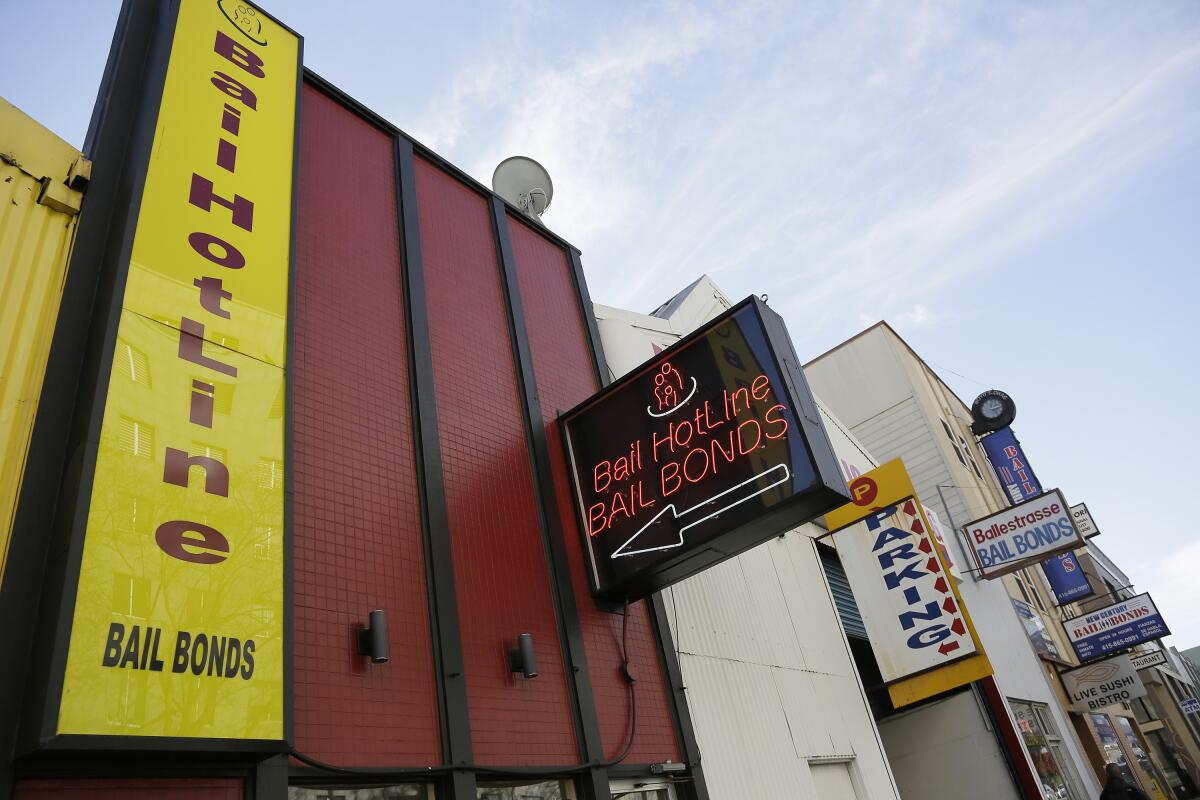Op-Ed: Stop using cash bail to separate mothers from their children

- Share via
In 2019, M., pregnant with her first child, was arrested and charged with a felony in Santa Clara County. At her first court appearance, M.’s public defender fought for her release. M. had diabetes, and to avoid complications, she needed to take prenatal vitamins, exercise regularly, carefully watch her diet and avoid stress. She couldn’t do that in jail. The judge refused to release her unless she paid hundreds of thousands of dollars in cash bail — an impossible sum.
For months, M. hoped that the judge would release her so she could access necessary prenatal care. But he repeatedly denied her bail motions, speculating that M., a Latina who did not use drugs, would get high while pregnant. It was safer for the baby, he said, if she stayed in custody.
On a day chosen because it was convenient for the jail, M. was taken to the hospital and induced. She was allowed just 48 hours with her newborn daughter before the baby was taken from her and she was sent back to jail, alone and in handcuffs.
Roughly 4,300 women across California will spend this Mother’s Day in pretrial custody. An estimated 80% are mothers, and most are their children’s primary caretakers. Pretrial incarceration — leading to coerced guilty pleas, unemployment and housing loss — devastates these women and their children, who are left behind.
This mass family-separation is the work of judges who break the law and elected bodies that fund incarceration over community-centered care. Last year, the California Supreme Court held that it is unconstitutional to jail presumptively innocent people solely because they cannot afford to pay cash bail. In January, the California Legislature extended the same protections to people accused of violating their probation. Yet, a recent report from Silicon Valley De-Bug, a community advocacy organization, found that judges continue to set unaffordable cash bail in most cases.
In one horrific instance this March, witnessed by a member of Silicon Valley De-Bug’s court-watching program, a woman who had initially been out of custody pretrial in San Mateo County missed court while giving birth. When she arrived for her next court-ordered appointment with her newborn, the police were waiting to arrest her. The new mother was brought to court three days later, inconsolably sobbing and repeatedly crying out, “where’s my baby?” In the three days she had been in custody, no one had told her or her husband where their child had been taken. The judge ordered her held on thousands of dollars in cash bail.
Unaffordable cash bail is often ordered in the name of public safety, but there is growing consensus that providing services and support, not cages, better protects our communities. Studies consistently demonstrate that meeting core needs like housing, healthcare and economic security significantly lowers instances of crime and violence while avoiding the harmful consequences of incarceration. Yet elected officials continually refuse to fund that community-care infrastructure.
Instead, building alternatives to incarceration has been left to community groups. In the Bay Area, for example, Silicon Valley De-Bug operates the Community Release Project through which organizers — not law enforcement — offer pretrial support for people arrested, including transportation to court, child care during court dates and help navigating public-benefit bureaucracies to connect people to services.
For the last five years, Essie Justice Group, a California-based organization of women with incarcerated loved ones, has similarly offered a community-based alternative. Together with the National Bail Out Collective, Essie bails out Black mothers who cannot afford their release. These annual “Black Mama’s Bail Out” events show how Black women are often most harmed by pretrial detention, where they are dramatically overrepresented in custody and serve the longest amounts of time.
This year, Essie bailed out Amber Sam, a 39-year-old Black mother of four from Long Beach. Amber was jailed for the first time in her life when she couldn’t afford to pay $50,000 bail. During her arrest, officers denied Amber’s pleas to allow her to call a family member to pick up her 3-year-old daughter. Instead, they arrested Amber in front of her daughter, then placed the toddler in foster care with a stranger.
After assessing Amber’s needs, Essie paid her bail and connected her to supportive housing, reunification resources and health services. Upon her release, Amber was connected to several Essie members — all Black women with incarcerated loved ones — who will continue to provide community, care and advocacy in and out of court in the months after her release. With their support, Amber has remained out of custody and is now starting a new job and working to regain parental rights to her daughter.
The harm unaffordable cash bail brings women and their families is unconscionable. Programs like De-Bug’s and Essie’s offer a glimpse into what’s possible if judges honor the constitutional right to pretrial freedom and lawmakers fund supportive, community-based alternatives to pretrial detention that keep families together.
Tejal Kothari is a senior strategist at Essie Justice Group. Carson White is a staff attorney with Civil Rights Corps and litigates challenges to cash bail in California and nationwide.
More to Read
A cure for the common opinion
Get thought-provoking perspectives with our weekly newsletter.
You may occasionally receive promotional content from the Los Angeles Times.










